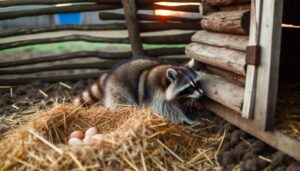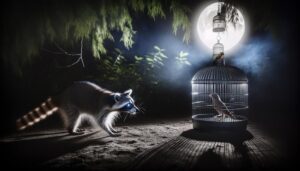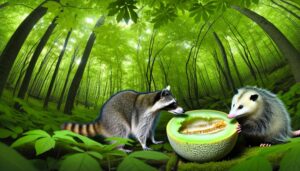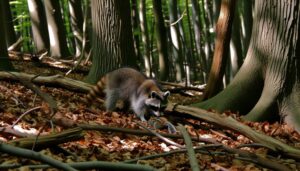How to Safely Let Raccoons Eat Cat Food
Raccoons can consume cat food, but such a diet is not suitable for their nutritional needs and can result in significant health issues. As omnivores, raccoons require a balanced diet rich in proteins, fats, and carbohydrates to support their metabolic processes and overall health.
The nutrient profile of cat food poses risks like obesity, malnutrition, and metabolic disorders due to its disproportionate macronutrient composition. High carbohydrate content may also contribute to dental issues.
Consequently, a diet that includes fruits, vegetables, nuts, insects, and small vertebrates is preferable for raccoons. Learn more to understand the complexities of their dietary needs and preventive measures.
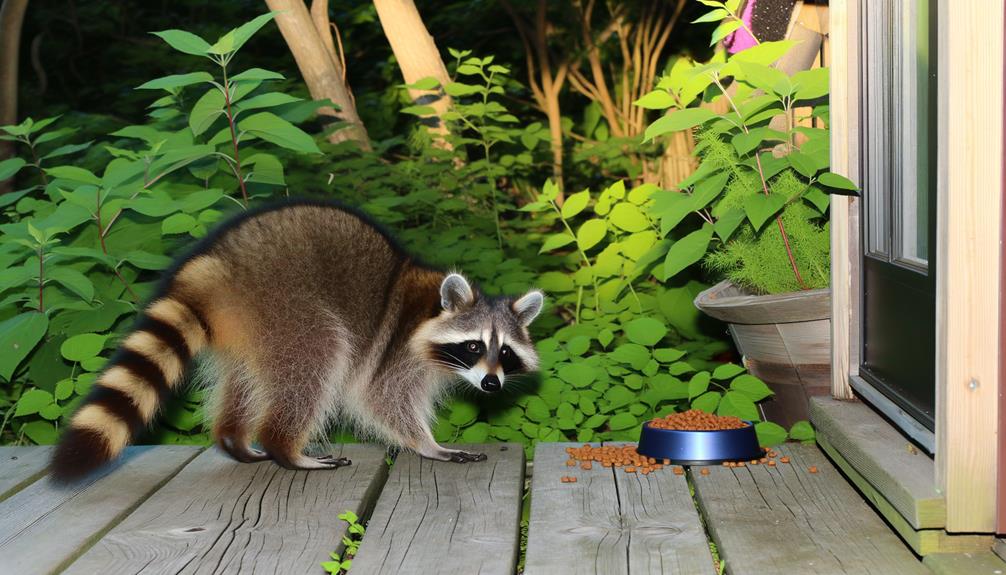
Key Takeaways
- Raccoons can eat cat food, but it doesn't meet their balanced dietary needs.
- Cat food may cause obesity and metabolic disorders in raccoons due to unbalanced nutrition.
- High carbohydrate content in cat food can lead to dental decay in raccoons.
- Feeding raccoons cat food could result in malnutrition and digestive issues.
- A varied diet including fruits, vegetables, and proteins is better for raccoons' health.
Raccoon Dietary Habits
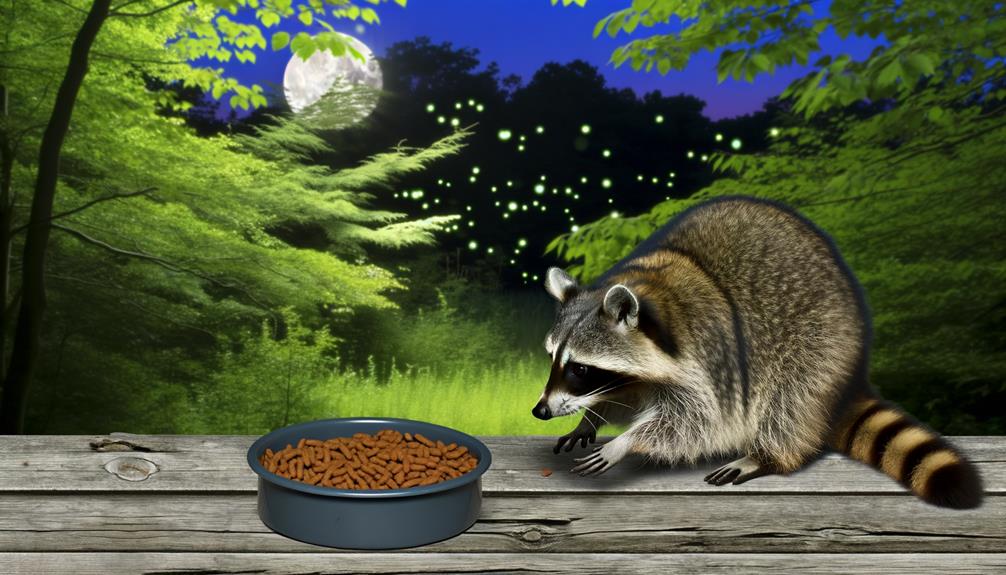
Raccoons (Procyon lotor) exhibit omnivorous dietary habits, consuming a diverse array of food sources that include fruits, nuts, small animals, and human-related food waste. This dietary plasticity is an adaptive trait that allows raccoons to thrive in various environments, from urban areas to rural landscapes.
Studies have shown that raccoons are opportunistic feeders, often modifying their diet based on seasonal availability and local food resources. In urban settings, raccoons frequently exploit anthropogenic food sources, such as discarded food waste and pet food, which can constitute a significant portion of their diet.
This flexible foraging behavior underscores their ecological versatility and has implications for their interactions with human environments, contributing to their status as a successful synanthropic species.
Nutritional Needs of Raccoons
Raccoons, as omnivores, require a diet that includes a balanced mix of proteins, fats, carbohydrates, as well as essential vitamins and minerals to maintain peak health.
Proper nutrient intake is vital to support their metabolic processes, immune function, and physical activity.
Understanding these nutritional needs is necessary to evaluate whether cat food can meet the dietary requirements of raccoons.
Omnivorous Diet Requirements
In examining the omnivorous diet requirements of raccoons, it is important to take into account their need for a balanced intake of proteins, fats, carbohydrates, vitamins, and minerals to maintain peak health.
Raccoons thrive on a diet that reflects their natural foraging behavior, encompassing a diverse array of food sources. Proteins, derived from animal matter such as insects, small mammals, and eggs, are vital for muscle development and repair.
Fats, found in nuts and seeds, provide essential energy reserves. Carbohydrates, sourced from fruits and vegetables, play a significant role in energy metabolism.
A well-rounded diet ensures raccoons receive adequate macronutrients to support their physiological functions, promoting best health and longevity in their natural habitats.
Essential Vitamins and Minerals
Sufficient intake of essential vitamins and minerals is important for raccoons to maintain peak health and physiological functions. These micronutrients play key roles in various metabolic processes, immune response, and overall well-being.
A balanced diet for raccoons should include:
- Vitamin A: Essential for vision, skin health, and immune function.
- Calcium and Phosphorus: Necessary for bone health and proper muscular function.
- Vitamin E: An antioxidant that protects cells from oxidative damage.
- B-Vitamins: Essential for energy metabolism and neurological health.
Evidence-based research highlights that a deficiency in these nutrients can lead to compromised health outcomes, such as weakened immune systems and skeletal deformities. Ensuring a diet rich in these vitamins and minerals is crucial for the well-being of raccoons.
Protein and Fat Balance
While sufficient vitamins and minerals are essential, a balanced intake of protein and fat is equally crucial for meeting the nutritional needs of raccoons. Raccoons are omnivorous, requiring a diet comprising approximately 20-25% protein and 15-20% fat.
Proteins are critical for growth, tissue repair, and enzymatic functions, while fats provide a dense energy source and are crucial for maintaining healthy skin and fur. Cat food, often high in protein and fat, can meet these macronutrient requirements but may lack other essential nutrients specific to raccoon health.
Hence, while cat food can be a temporary solution, it is not suitable as a long-term dietary staple. A raccoon's diet should be diversified to ensure all-around nutritional adequacy.
Ingredients in Cat Food
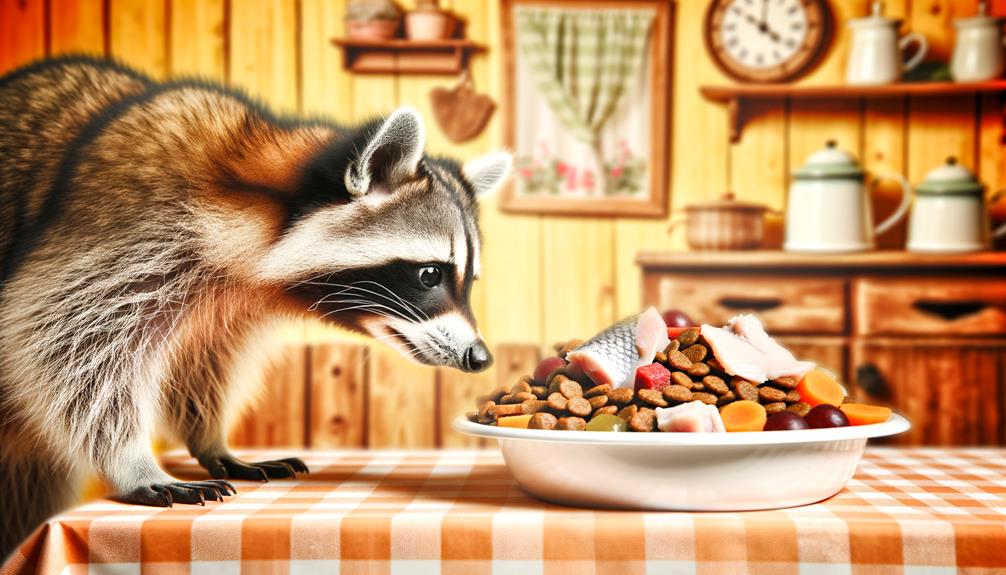
Cat food primarily consists of protein sources such as meat, fish, and poultry, complemented by essential fats, carbohydrates, vitamins, and minerals. Analyzing the nutritional content of these ingredients reveals high protein levels designed to meet the metabolic demands of obligate carnivores.
To assess the suitability of cat food for raccoons, a comparative evaluation of these nutrient profiles to raccoon dietary requirements is necessary.
Common Cat Food Ingredients
A typical formulation of commercial cat food includes high-quality proteins, essential fatty acids, vitamins, and minerals designed to meet the specific dietary requirements of felines.
The primary ingredients often found in cat food are:
- Proteins: Typically derived from animal sources such as chicken, beef, or fish, proteins are important for muscle development and repair.
- Fats: These provide essential fatty acids like omega-3 and omega-6, which are essential for skin health and cellular functions.
- Vitamins: Including vitamins A, D, and E, these micronutrients support various physiological processes, including vision and immune function.
- Minerals: Key minerals like calcium and phosphorus are necessary for bone health and metabolic activities.
These components collectively ensure balanced nutrition tailored to a cat's physiological needs.
Nutritional Content Analysis
Analyzing the nutritional content of cat food reveals a meticulously balanced composition of macronutrients and micronutrients tailored to meet the dietary needs of felines. Typically, cat food contains high protein levels (30-50%), primarily derived from animal sources such as chicken, fish, or beef.
Essential amino acids like taurine are incorporated, critical for feline cardiovascular and retinal health. Fats, constituting approximately 20-30%, provide energy and facilitate the absorption of fat-soluble vitamins. Carbohydrates, although minimal, offer some fiber for digestive health.
Micronutrients, including vitamins A, D, and E, alongside minerals like calcium, phosphorus, and magnesium, are precisely calibrated to support overall feline wellness. This specialized formulation guarantees cats receive balanced nutrition, but may not be entirely suitable for other species like raccoons.
Health Impacts on Raccoons
The consumption of cat food by raccoons can lead to various health impacts due to the nutritional imbalances and potential ingredients unsuitable for their dietary needs. Raccoons require a varied diet to meet their complex nutritional requirements.
Regular ingestion of cat food can lead to:
- Obesity: High fat and carbohydrate content in cat food can result in excessive weight gain.
- Nutrient Deficiency: Cat food lacks essential nutrients like fiber, leading to deficiencies over time.
- Kidney Issues: The high protein levels in cat food can strain raccoons' kidneys, potentially causing renal damage.
- Dental Problems: Cat food often contains additives that can lead to dental decay and gum disease in raccoons.
Understanding these impacts is vital for wildlife health management.
Behavioral Changes
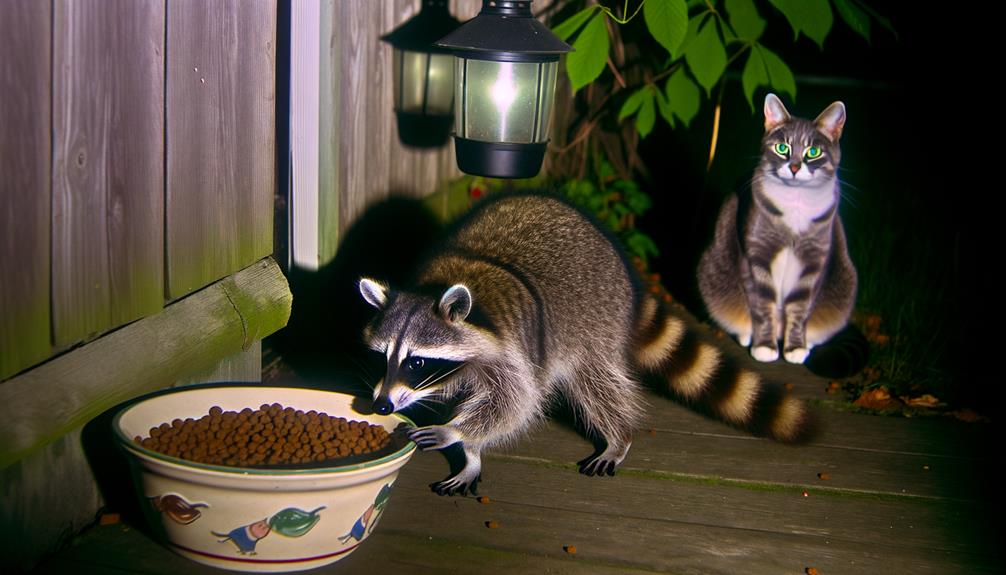
Understanding the potential health impacts, it is equally important to examine the behavioral changes that occur in raccoons when they consume cat food regularly.
Evidence suggests that raccoons exhibit increased habituation to human environments due to the easy availability of cat food. This altered foraging behavior can lead to a dependency on anthropogenic food sources, diminishing their natural hunting and scavenging skills.
Additionally, raccoons may display heightened territoriality and aggression as they compete for this readily available resource. Studies also indicate a potential shift in their nocturnal activity patterns, with more frequent daytime appearances, increasing the likelihood of human-wildlife conflict.
These behavioral modifications underscore the broader ecological implications of providing raccoons with non-native food sources like cat food.
Risks of Feeding Cat Food
Feeding cat food to raccoons poses significant risks, primarily due to its unbalanced nutritional content that can lead to various health issues such as obesity, malnutrition, and metabolic disorders. Cat food is formulated specifically for felines, whose dietary requirements differ substantially from those of raccoons. The high protein and fat levels in cat food can disrupt a raccoon's digestive system and long-term health.
Key risks include:
- Obesity: Excess calories and fat can cause significant weight gain.
- Malnutrition: Lack of essential vitamins and minerals tailored for raccoons.
- Metabolic Disorders: Imbalances in nutrients can lead to metabolic complications.
- Dental Issues: High carbohydrate content may contribute to dental decay.
These risks underscore the importance of providing species-appropriate diets.
Alternative Food Options
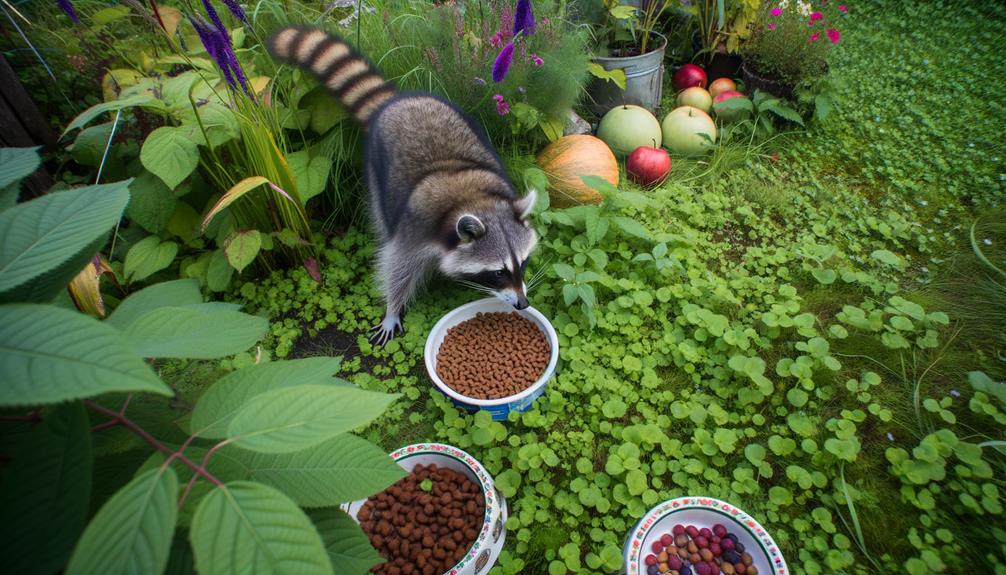
Considering the nutritional deficiencies of cat food for raccoons, it is crucial to explore alternative food options that align more closely with their natural dietary needs.
Raccoons are omnivores with a diverse diet consisting of fruits, vegetables, nuts, insects, and small vertebrates. Providing a balanced diet that mirrors their natural foraging can enhance their health and well-being.
Scientific studies suggest that a diet rich in protein, essential fatty acids, and fiber is ideal. For example, offering raw or cooked chicken, fish, eggs, and a variety of fresh produce can meet their nutritional requirements.
Additionally, commercially available raccoon-specific feeds can guarantee they receive the necessary vitamins and minerals, reducing the risks associated with an imbalanced diet.
Preventing Raccoon Intrusions
To effectively prevent raccoon intrusions, it is essential to implement a multi-faceted approach that integrates habitat modification, exclusion techniques, and deterrents based on scientific evidence. This approach should aim to reduce attractants and enhance barriers to entry.
Key strategies include:
- Secure Garbage: Utilize raccoon-proof trash cans and make sure lids are tightly sealed to eliminate food sources.
- Seal Entry Points: Repair any gaps, holes, or weaknesses in buildings and fencing to prevent access.
- Remove Food Sources: Avoid leaving pet food outdoors overnight and clean up fallen fruits or birdseed.
- Use Deterrents: Implement motion-activated lights, ultrasonic devices, or natural repellents like ammonia-soaked rags.
These measures, supported by research, will markedly mitigate raccoon intrusions.
Conclusion
To sum up, while raccoons may opportunistically eat cat food, this behavior does not correspond to their dietary requirements, possibly resulting in health issues and changes in behavior.
The components in cat food, designed mainly for cats, do not contain the necessary nutrients for raccoons.
Providing cat food to raccoons is like trying to fit a puzzle piece that doesn't quite match their dietary needs.
As a result, other food choices should be explored to guarantee their health and reduce the chances of conflicts between humans and wildlife.

